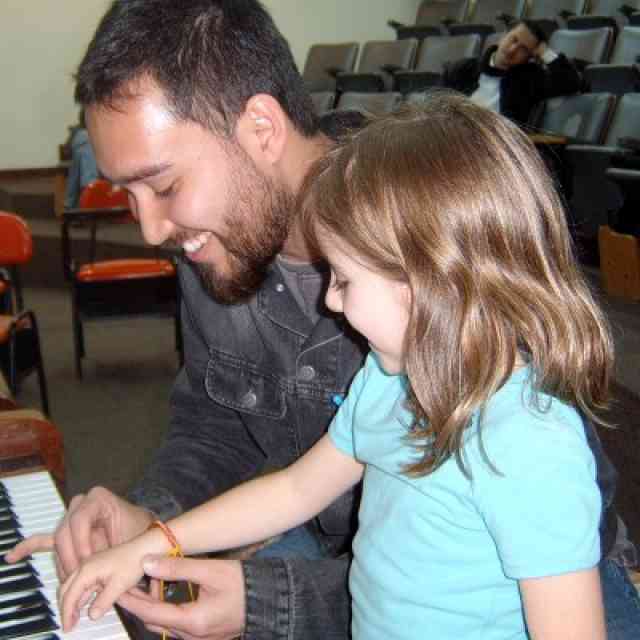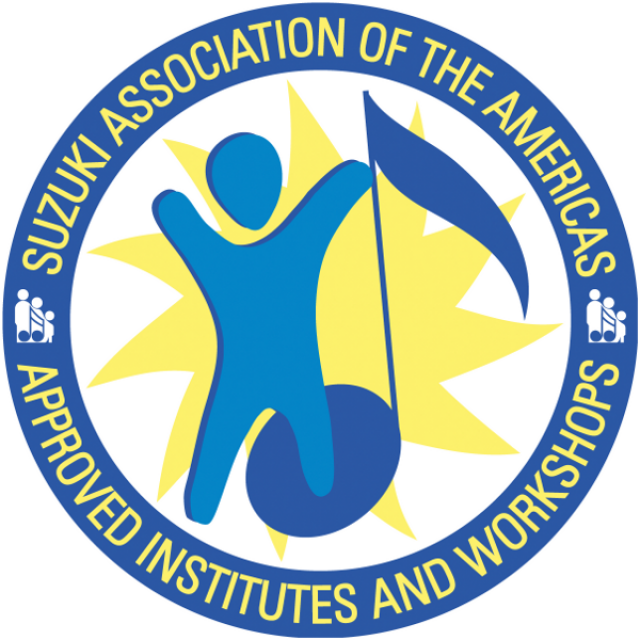It is the first night at Ogontz Suzuki Institute. The families have just settled into their outdoor cabins, shared a wonderful home cooked meal together with the faculty, and we have all helped with the dishes. It is now time for the opening play-in. Everyone gathers their instruments as they head out across the grassy upper campus to the rehearsal hall. Parents call from their cabins to the children playing a pick up game of soccer as they reach for their flashlights—they won’t need them now, but after the play-in the night will be darker than any city can ever get, and the woods will be alive with music.
As we enter the rustic log cabin-style rehearsal hall, there is a fire crackling in the fireplace. Ogontz Suzuki Institute banners hang from the rafters, one banner per year, made from the handprints of all the participants. Children excitedly point out their own handprints from year to year as instrument cases crowd the aisles, bows pointing everywhere, and the smell of fresh rosin dust fills the air. Lines are forming, and musicians young and old clamor for their instruments to get tuned and find their places to play. Old friends greet one another, sharing smiles and excitement at the upcoming week.
Out of this friendly chaos the opening Twinkle begins. Time is suspended and we all pick up where we left off last year. All the instruments are playing together and the new Twinklers proudly play their piece with a steady drone of A’s for those who prefer it. The teens support the music with their rich tones, the faculty shine with warmth in each smile, and all of the parents and grandparents sing. We’re all singing, strong and loud, with our eyes on our children as we experience the magic of our music.
There are few doors at Camp Ogontz. Nestled in the woods the outdoor cabins breathe the fresh mountain air together. Classes sometimes take place outside if the weather is good, or they may happen in a newly renovated horse stall or at the boathouse. You may have a five-minute walk up a mountain or alongside the lake to your next class but the exercise is made sweeter by the wild blackberries growing alongside the path. Many a lesson has been played with blackberry-stained hands.
There are no doors to walk through to prove yourself either. Classes are often mixed in age and ability level as we all challenge ourselves to put down our preconceived notions of who we should be, where we should be, or how we should sound. The Ogontz community supports accepting yourself for who you are, discovering your personal goals and pursuing them. Nowhere at camp will you ever see posted any list or reference to a level of class or student. Group classes are named after trees. Recitals are open to everyone and each person’s ability is celebrated.
Family music is what we are all about. Parents and siblings are invited to participate in chamber music and theatre classes as well, no matter what their age or instrument. Formal chamber music may begin when a student is comfortable with certain skills, but informal chamber music gatherings happen nightly and all are invited and inspired to join in. Amidst games of scrabble and cards, and as the parents hand screen our T-shirts, there is always spontaneous chamber music. Some nights we play accompaniment parts to Twinkle and other nights it’s Grieg’s Holberg Suite for 40 with the added resonance of recorder, flute, guitar, and trombone.
There are no doors that separate us. We each come to camp with our titles, our roles and our responsibilities. At Ogontz we are released from these. The camp is run with a cooperative plan where all parents and teenagers sign up for chores and help run the camp. You may be washing dishes, cleaning cabins, or be in charge of the morning coffee for the week. If you enjoy the camaraderie there is always more help needed in the bakery with the afternoon bread or you can stop by the wood shop to see what project is underway. We all depend on each other in the most basic of ways so friendships form quickly as we begin to function as a community. Imagine one camper’s surprise to learn that the man washing the floors with him all week is a Nobel Laureate-how nice for both of them.
Magic happens at Ogontz all the time. People come together and share their talents; hundreds of origami cranes have been made for a concert, a wedding ring lost in the lake found after hours of diving by fellow parents, and jug bands formed to accompany the traditional hilarity of the 7 a.m. “plunge in the Lake.” Folks have helped to assemble hundreds of luminaria to line the path home after the final concert, and families have shared their culture with us through dance and cooking. Poetry written and pieces composed, people young and old have had profound breakthroughs at Ogontz. What we call magic becomes a part of our every day living at camp. We are truly a community. Everyone thrives.
Is it that there are no doors? Is it that we all agree to live without boundaries for six days? Is it the sheer beauty of the natural surroundings? Is it that we all depend on each other to get through the day, or is it the power of music? I don’t know. What I do know is that when people come together for a common purpose, when they work together towards that purpose, and when they offer their uniqueness to the group, magical things happen.
For more information about the Ogontz Suzuki Institute, go to www.campogontz.com
Excerpt only. Read the complete article in the American Suzuki Journal.








